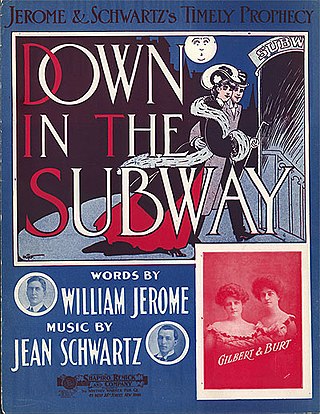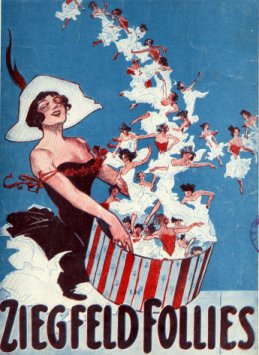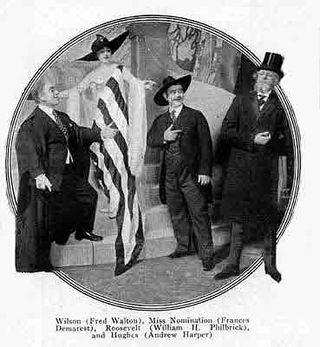
Jean Schwartz was a Hungarian-born American composer best known for his work writing the scores for several Broadway musicals. With the lyricist William Jerome, he was a prolific songwriter and together the duo crafted a large body of work for both Broadway and Tin Pan Alley. While Schwartz was mainly concerned with writing the music to his songs, he did on occasion work as a lyricist as well. He was a founding member of the American Society of Composers, Authors and Publishers.

The Ziegfeld Follies were a series of elaborate theatrical revue productions on Broadway in New York City from 1907 to 1931, with renewals in 1934, 1936, 1943, and 1957. They became a radio program in 1932 and 1936 as The Ziegfeld Follies of the Air.

Sigmund Romberg was a Hungarian-born American composer. He is best known for his musicals and operettas, particularly The Student Prince (1924), The Desert Song (1926) and The New Moon (1928).

Gay Divorce is a musical with music and lyrics by Cole Porter and book by Dwight Taylor, adapted by Kenneth Webb and Samuel Hoffenstein. It was Fred Astaire's last Broadway show and featured the hit song "Night and Day" in which Astaire danced with co-star Claire Luce.

The Passing Show of 1916 is a revue featuring the music of Sigmund Romberg and Otto Motzan, with book and lyrics by Harold Atteridge. It included the first George Gershwin songs introduced in a Broadway show.
The Dream Girl is an operetta in three acts with music by Victor Herbert and book by Rida Johnson Young and Harold Atteridge. Based on the 1906 play The Road to Yesterday, by Beulah Marie Dix and Evelyn Greenleaf Sutherland, its satiric story concerns reincarnation. Additional music was written by Sigmund Romberg. The piece was Victor Herbert's last musical composition, and the work was produced posthumously on Broadway in 1924.

Bombo is a Broadway musical with a book and lyrics by Harold Atteridge and music by Sigmund Romberg.

Robinson Crusoe, Jr. is a musical with a book by Edgar Smith, lyrics by Harold Atteridge, and music by Sigmund Romberg and James Hanley.

Sinbad is a Broadway musical with a book and lyrics by Harold Atteridge and music by Sigmund Romberg, Al Jolson and others. Jolson plays a porter in old Bagdad where he meets a series of characters from the Arabian Nights, including Sinbad. He is transported to various exotic settings.

My Maryland is a "musical romance" with book and lyrics by Dorothy Donnelly and music by Sigmund Romberg, based on the play Barbara Frietchie by Clyde Fitch. The musical takes place in the towns of Frederick, Maryland and Hagerstown, Maryland.

The Passing Show was a musical revue in three acts, billed as a "topical extravaganza", with a book and lyrics by Sydney Rosenfeld and music by Ludwig Engländer and various other composers. It featured spoofs of theatrical productions of the past season. The show was presented in 1894 by George Lederer at the Casino Theatre. It was one of the first musical revues on Broadway and led the fashion for such productions. The Casino Theatre produced a revue each summer thereafter for several seasons.
Miss 1917 is a musical revue with a book by Guy Bolton and P. G. Wodehouse, music by Victor Herbert, Jerome Kern and others, and lyrics by Harry B. Smith, Otto Harbach, Henry Blossom and others. Made up of a string of vignettes, the show features songs from such musicals as The Wizard of Oz, Three Twins, Babes in Toyland, Ziegfeld Follies and The Belle of New York.
Harold Richard Atteridge was an American composer, librettist and lyricist primarily for musicals and revues. He wrote the book and lyrics for over 20 musicals and revues for the Shubert family, including several iterations of The Passing Show.

Central Theatre was a Broadway theatre in New York City built in 1918. It was located at 1567 Broadway, at the southwest corner with 47th Street, and seated approximately 1,100 patrons. The architect was Herbert J. Krapp. The theatre was built by the Shubert family on a site previously occupied by the Mathushek & Son piano factory.

Make It Snappy was a musical revue that ran for 96 performances at the Winter Garden Theatre in the 1922–23 Broadway season. It ran from 13 April to 1 July 1922. It starred Eddie Cantor, who introduced the hit songs "Yes! We Have No Bananas" and "The Sheik of Araby".
Jesse C. Huffman (1869–1935) was an American theatrical director. Between 1906 and 1932 he directed or staged over 200 shows, mostly for the Shubert Brothers. Many of them were musical revues, musicals or operettas. He is known for The Passing Show series of revues that he staged from 1914 to 1924 at the Winter Garden Theatre on Broadway, daring alternatives to the Ziegfeld Follies.

Vera Michelena was an American actress, contralto prima donna and dancer who appeared in light opera, musical comedy, vaudeville and silent film. She was perhaps best remembered for her starring roles in the musicals The Princess Chic, Flo Flo and The Waltz Dream, her rendition of the vampire dance in the musical Take It from Me and as a Ziegfeld Follies performer.

Artists and Models was a series of five theatrical revues staged by brothers Lee and J. J. Shubert at the Shubert Theatre and other theaters operated by The Shubert Organization in New York City between 1923 and 1930.
The Squab Farm was a comedic play about the film industry staged on Broadway in 1918. It was written by Fanny Hatton and Frederic Hatton, and staged at the Bijou Theatre on Broadway. It starred several former film directors as well as actress Alma Tell and a 16-year-old Tallulah Bankhead in her first stage role. She was reportedly chastised for whistling in the communal dressing room, unknowingly breaking one of the theater's oldest superstitions and fellow actress Julia Bruns took pity on her and invited to share her dressing room. George Foster Platt directed.
The Whirl of the World is a musical revue in two acts with music by Sigmund Romberg and both book and lyrics by Harold Atteridge. The work also contained some additional songs by Harry Gifford and Fred Godfrey. The musical premiered on Broadway at the Winter Garden Theatre on January 10, 1914. It closed on May 30, 1914, after 161 performances. Produced by brothers Lee and Jacob J. Shubert, the production was staged by William J. Wilson and used costumes designed by Melville Ellis.














